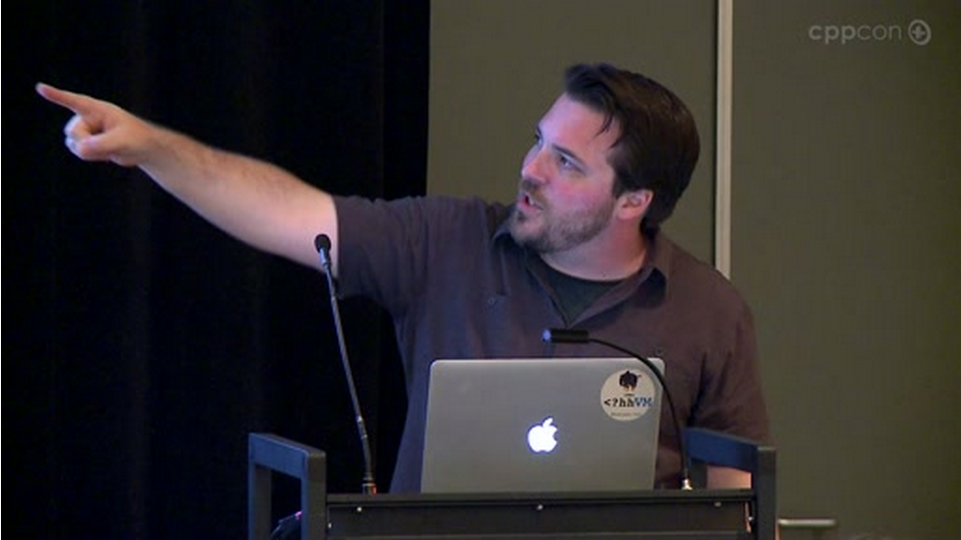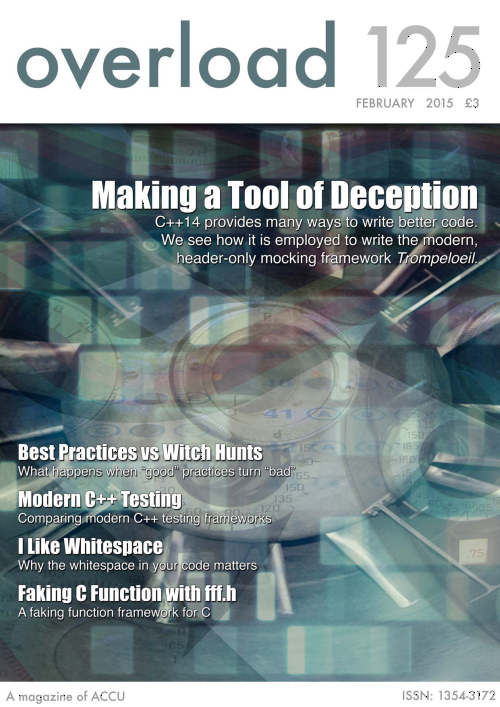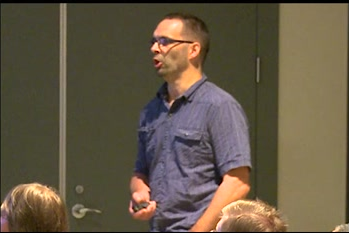2015-02 mid-meeting mailing available
The 2015-02 mailing of new standards papers is now available.
NOTE: A number of these papers have already been publicized on this blog. This is the complete list including ones not previously publicized.
| WG21 Number | Title | Author | Document Date | Mailing Date | Previous Version | Subgroup | Disposition |
|---|---|---|---|---|---|---|---|
| N4340 | Remove Deprecated Use of the register Keyword | Alisdair Meredith | 2014-11-26 | 2015-02 | Evolution | ||
| N4341 | C++ Standard Library Active Issues List (Revision R92) | Alisdair Meredith | missing | Library | |||
| N4342 | C++ Standard Library Defect Report List (Revision R92) | Alisdair Meredith | missing | Library | |||
| N4343 | C++ Standard Library Closed Issues List (Revision R92) | Alisdair Meredith | missing | Library | |||
| N4344 | Suggested Design for Customization Points | Eric Niebler | missing | Library | |||
| N4345 | Ranges for the Standard Library, Revision 2 | Eric Niebler | missing | Library | |||
| N4346 | Multidimensional bounds, index and array_view, revision 5 | Lukasz Mendakiewicz | 2015-01-05 | 2015-02 | N4177 | Library | |
| N4347 | Responses to National Body Comments, PDTS 19568, Library Fundamentals | Barry Hedquist | missing | ||||
| N4348 | Making std::function thread-safe | Geoffrey Romer | 2015-02-02 | 2015-02 | N4159 | Library | |
| N4349 | Minutes of WG21 Telecon | Jonathan Wakely | 2014-12-05 | 2015-02 | |||
| N4350 | Agenda and Meeting Notice for WG21 Concepts Meeting Notice (revision 1) | Herb Sutter | 2015-01-15 | 2015-02 | N4339 | ||
| N4351 | Responses to National Body Comments, PDTS 19570, C++ Extensions for Parallelism | Barry Hedquist | 2014-12-23 | 2015-02 | |||
| N4352 | Parallelism TS | Jared Hoberock | 2015-01-08 | 2015-02 | N4310 | ||
| N4353 | Parallelism TS - Editor's Report | Jared Hoberock | 2015-01-08 | 2015-02 | |||
| N4354 | Parallelism TS - DTS Ballot Document | Jared Hoberock | 2015-01-08 | 2015-02 | |||
| N4355 | Shared Multidimensional Arrays with Polymorphic Layout | Carter Edwards | 2015-02-04 | 2015-02 | Library | ||
| N4356 | Relaxed Array Type Declarator | Carter Edwards | 2015-02-04 | 2015-02 | Evolution | ||
| N4357 | Introduce the [[noexit]] attribute for main as a hint to eliminate destructor calls for objects with static storage duration | Jens Maurer | 2015-01-19 | 2015-02 | N4226 | Evolution | |
| N4358 | Unary Folds and Empty Parameter Packs | Thibaut Le Jehan | 2015-01-20 | 2015-02 | Evolution | ||
| N4359 | A Proposal to Add vector release method just like unique_ptr release method to the Standard Library | Jerry Liang | 2015-01-09 | 2015-02 | Library | ||
| N4360 | Delayed Evaluation Parameters | Douglas Boffey | 2015-01-22 | 2015-02 | Evolution | ||
| N4361 | Concepts Lite TS | Andrew Sutton | 2015-01-27 | 2015-02 | N4333 | ||
| N4362 | WG21 2015-01 Skillman Minutes | John Spicer | 2015-01-27 | 2015-02 | |||
| N4363 | Library Fundamentals v1 DTS | Jeffrey Yasskin | missing | ||||
| N4364 | Editor's Report for the Library Fundamentals v1 DTS | Jeffrey Yasskin | missing | ||||
| N4365 | Responses to National Body Comments, ISO/IEC PDTS 19568, C++ Extensions for Library Fundamentals | Barry Hedquist | 2015-01-29 | 2015-02 | |||
| N4366 | LWG 2228: Missing SFINAE rule in unique_ptr templated assignment | Howard Hinnant | 2015-01-11 | 2015-02 | Library | ||
| N4367 | Comparison in C++ | Lawrence Crowl | 2015-02-08 | 2015-02 | Evolution | ||
| N4368 | Introducing alias size_type for type size_t in class std::bitset | Vladimir Grigoriev | 2015-02-03 | 2015-02 | Library evolution | ||
| N4369 | Default argument for second parameter of std::advance | Vladimir Grigoriev | 2015-01-12 | 2015-02 | Library evolution | ||
| N4370 | Networking Library Proposal (Revision 4) | Christopher Kohlhoff | 2015-02-06 | 2015-02 | N4332 | Library | |
| N4371 | Minimal incomplete type support for standard containers, revision 2 | Zhihao Yuan | 2015-02-04 | 2015-02 | N4056 | Library | |
| N4372 | A Proposal to Add a Const-Propagating Wrapper to the Standard Library | Jonathan Coe | 2015-02-06 | 2015-02 | N4209 | Library | |
| N4373 | Atomic View | Carter Edwards, Hans Boehm | 2015-01-26 | 2015-02 | N4142 | Library | |
| N4374 | Linux-Kernel Memory Mode | Paul E. McKenney | 2015-02-06 | 2015-02 | N4322 | Concurrency | |
| N4375 | Out-of-Thin-Air Execution is Vacuous | Paul E. McKenney | 2015-02-06 | 2015-02 | N4323 | Concurrency | |
| N4376 | Use Cases for Thread-Local Storage | Paul E. McKenney | 2015-02-06 | 2015-02 | N4324 | Concurrency | |
| N4377 | C++ Extensions for Concepts PDTS | Andrew Sutton | 2015-02-09 | 2015-02 | |||
| N4378 | Language Support for Contract Assertions | John Lakos, Nathan Myers, Alexei Zakharov, Alexander Beels | 2015-02-08 | 2015-02 | Evolution | ||
| N4379 | FAQ about N4378, Language Support for Contract Assertions | John Lakos, Nathan Myers | 2015-02-08 | 2015-02 | Evolution | ||
| N4380 | Constant View: A proposal for a std::as_const helper function template | ADAM David Alan Martin, Alisdair Meredith | 2015-02-05 | 2015-02 | Library |

 While we wait for CppCon 2015 in September, we’re featuring videos of some of the 100+ talks from CppCon 2014. Here is today’s feature:
While we wait for CppCon 2015 in September, we’re featuring videos of some of the 100+ talks from CppCon 2014. Here is today’s feature: There was a lot of interest for the
There was a lot of interest for the  A new article of interest for library developers:
A new article of interest for library developers:
 While we wait for CppCon 2015 in September, we’re featuring videos of some of the 100+ talks from CppCon 2014. Here is today’s feature:
While we wait for CppCon 2015 in September, we’re featuring videos of some of the 100+ talks from CppCon 2014. Here is today’s feature: While we wait for CppCon 2015 in September, we’re featuring videos of some of the 100+ talks from CppCon 2014. Here is today’s feature:
While we wait for CppCon 2015 in September, we’re featuring videos of some of the 100+ talks from CppCon 2014. Here is today’s feature: